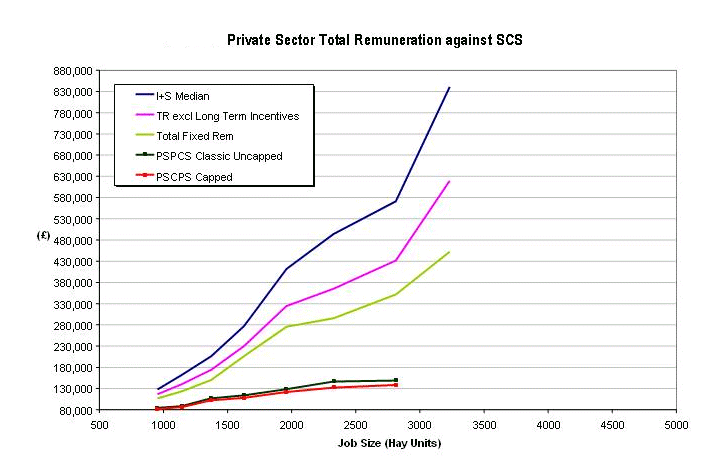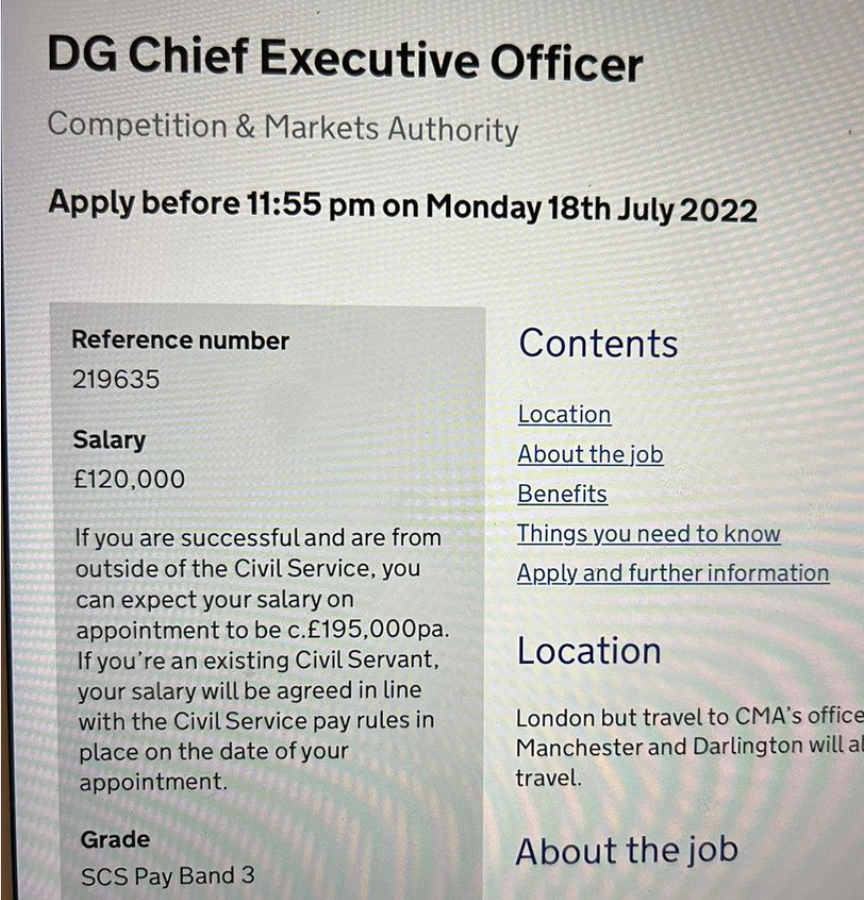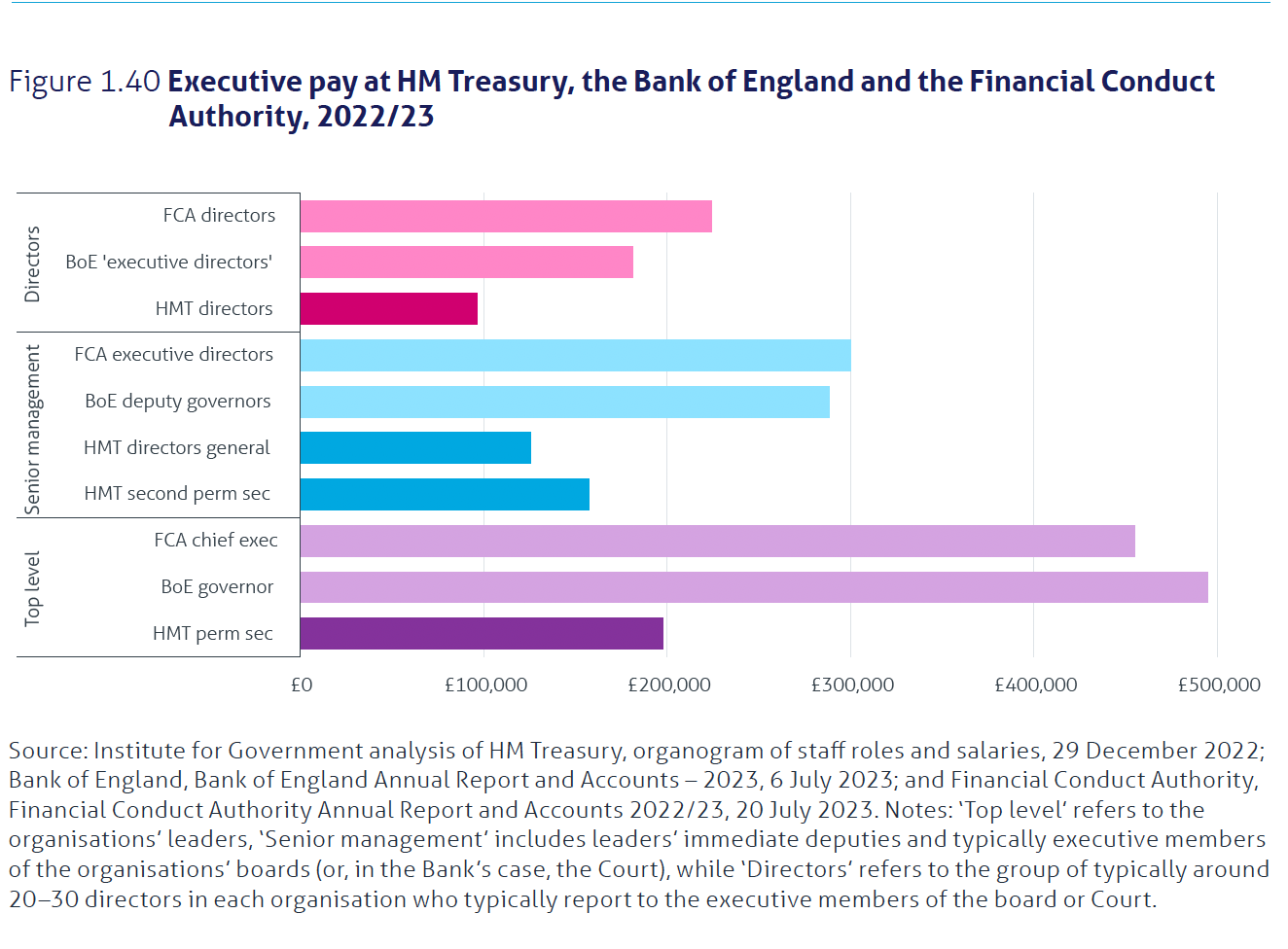Although there are only around 4,000 of them (around 0.8% of the total), a good deal of attention is paid each year to the salaries of the SCS. This is because
- they are very well paid relative to the taxpaying population at large, and yet
- they are very poorly paid relative to their private sector counterparts - and to other senior staff in the public sector, even though
- their jobs are these days no more secure than those of those same counterparts.
By way of background, it is well worth reading the 2021 IfG report Pay Reform for the Senior Civil Service. Commenting on the report, the IfG's Alex Thomas noted that:
'A decade of wage restraint means that median civil service salaries have fallen in real terms by 14-17% since 2009. A civil service director’s base pay is half that of their equivalent in the private sector. While generous civil service pensions bridge around half the gap, the government has recognised that the current system requires reform. ...
However, reforming pay is unlikely to do much on its own to reduce job churn within the civil service. Our interviews with private sector experts, professional bodies and civil servants themselves found that changing the criteria for promotion, and more focus from ministers and top officials on keeping people in post, will make a bigger difference.
Senior civil servants are motivated by the work they do, their seniority and their status more than by pay. So changing how civil servants are promoted and the skills that ministers and permanent secretaries value is a more important step towards reducing excessive turnover than tweaking how much government officials are paid.'
Comparison with the Private Sector
Equivalent private sector salaries are much higher. Most obviously, more than 2,800 people in the City of London were already paid more than £1m in 2009, according to the Financial Services Authority. But the detail is also very telling.
- (Including bonuses, benefits and the value of annual pension benefit accrual) Median total remuneration of Pay Band 1 SCS officials was only £94k in 2011, compared with £103k and £142k respectively for their counterparts in the wider public sector and the private sector.
- The equivalent figures for Pay Band 2 were £128/191/290k.
- And the equivalent figures for Pay Band 3 were £167/not known/659k. In other words, Directors General (PB3) earned only 25% of their private sector equivalents.
These comparisons were typically much worse (for the SCS) than they had been four years earlier, which strongly suggest that higher paid private sector employees had managed to insulate themselves from the pressures that caused reductions in the real remuneration of most of their staff as well as the whole of the public sector. The SCS, in contrast, suffered badly from the combined effect of pay freezes, increases in pension contributions, reductions in bonuses etc. The SSRB reported in 2015 that "most of our remit group members have experienced a fall of between a fifth and a quarter in their real terms take-home earnings between 2009-10 and 2014-15". Then, in 2016, the SSRB reported that 'public sector pay, for full-time employees, at the 98th percentile in 2015 was approximately 18% lower than in the private sector, at around £90,000 compared to £110,000'. Further detail is in annual SSRB reports.
A more detailed comparison of civil service and private sector pay is in Hay's 2005 Pay Market Comparability Study which contains the following telling chart. (The bottom two lines are SCS remuneration inc. pension; I&S = industrial & service sector, excluding financial services and main board members; TR = total remuneration.)

The situation hasn't improved over recent years. HM Treasury sought to recruit a Head of Cyber Security on a salary of up to £57,500 in March 2023. A small City of London trading company (Hunter Bond) advertised the same role at the same time offering total compensation of 'up to £450,000'.
Around the same time, No.10 was anxious to recruit someone with 'exceptional data science expertise to tackle the most pressing problems of our time ... an unparalleled opportunity ... to influence the most powerful decision makers in the country, including the Prime Minister'. Salary? £54,700.
Dual Market in SCS Recruitment
Meanwhile, ministers persist in valuing private sector employees much more highly than their own staff.
Successive SSRB reports have expressed increasing concern about the dual market in SCS recruitment, as around half of all SCS appointments have in recent years been made from outside the SCS itself, and very often at significantly higher salaries. One SSRB report a few years ago noted that internal recruits to Pay Band 2 were appointed at salaries which averaged £92,000, whilst the equivalent figure for external candidates was £102,500. See the latest SSRB reports for further detail, comment and analysis.
This 2022 job advertisement was unusual only in its honesty about the dual market:-

Comparison with the Rest of the Public Sector
Others in the public sector - subject to less political and media pressure - are often paid much more.
Indeed, public sector media pay can be astonishingly high, presumably because this is less likely to be criticised by colleagues elsewhere in the media. Channel 4 TV, for instance, paid its Chief Executive £957k in 2016.
The Chief Executive of the company building the HS2 railway line and the Chief Executive of Network Rail were in 2022 reported to be earning £620k and £585k respectively.
(The Cabinet Secretary earned just over £200k in 2022.)
Here is the IfG's comparison of the salaries of the most senior civil servants compared with their peers in the Bank of England and a major financial regulator:

The government publishes every year a list of the highest public sector salaries for which it has some responsibility. This spreadsheet, for example, was published in 2020. For comparison, the 2017 version is here.
My What is a Civil Servant? web page will help you understand the difference between the civil service and the rest of the public sector.
Job Security
The same Hay report notes that, although SCS staff turnover remained low at around 10%, it was on a rising trend. Also, recent SSRB reports confirm that only 20-30% of SCS leavers do so on retirement. The others resign or come to the end of fixed term contracts or are encouraged to leave with the help of early retirement packages. Just as in the higher levels of the private sector, there is a high attrition rate at age 50 and above. Click here for more detail.
[Follow this link for information about the remuneration of the wider civil service.]